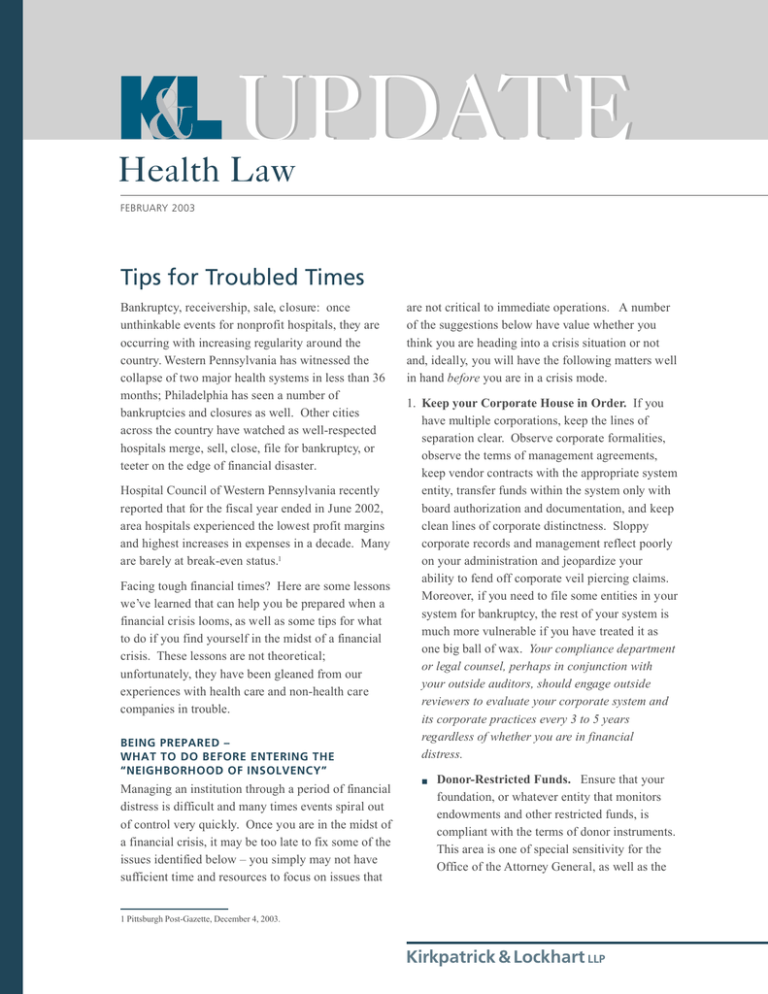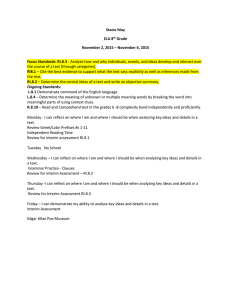
UPDATE
Health Law
FEBRUARY 2003
Tips for Troubled Times
Bankruptcy, receivership, sale, closure: once
unthinkable events for nonprofit hospitals, they are
occurring with increasing regularity around the
country. Western Pennsylvania has witnessed the
collapse of two major health systems in less than 36
months; Philadelphia has seen a number of
bankruptcies and closures as well. Other cities
across the country have watched as well-respected
hospitals merge, sell, close, file for bankruptcy, or
teeter on the edge of financial disaster.
Hospital Council of Western Pennsylvania recently
reported that for the fiscal year ended in June 2002,
area hospitals experienced the lowest profit margins
and highest increases in expenses in a decade. Many
are barely at break-even status.1
Facing tough financial times? Here are some lessons
we’ve learned that can help you be prepared when a
financial crisis looms, as well as some tips for what
to do if you find yourself in the midst of a financial
crisis. These lessons are not theoretical;
unfortunately, they have been gleaned from our
experiences with health care and non-health care
companies in trouble.
BEING PREPARED –
WHAT TO DO BEFORE ENTERING THE
“NEIGHBORHOOD OF INSOLVENCY”
are not critical to immediate operations. A number
of the suggestions below have value whether you
think you are heading into a crisis situation or not
and, ideally, you will have the following matters well
in hand before you are in a crisis mode.
1. Keep your Corporate House in Order. If you
have multiple corporations, keep the lines of
separation clear. Observe corporate formalities,
observe the terms of management agreements,
keep vendor contracts with the appropriate system
entity, transfer funds within the system only with
board authorization and documentation, and keep
clean lines of corporate distinctness. Sloppy
corporate records and management reflect poorly
on your administration and jeopardize your
ability to fend off corporate veil piercing claims.
Moreover, if you need to file some entities in your
system for bankruptcy, the rest of your system is
much more vulnerable if you have treated it as
one big ball of wax. Your compliance department
or legal counsel, perhaps in conjunction with
your outside auditors, should engage outside
reviewers to evaluate your corporate system and
its corporate practices every 3 to 5 years
regardless of whether you are in financial
distress.
■
Managing an institution through a period of financial
distress is difficult and many times events spiral out
of control very quickly. Once you are in the midst of
a financial crisis, it may be too late to fix some of the
issues identified below – you simply may not have
sufficient time and resources to focus on issues that
Donor-Restricted Funds. Ensure that your
foundation, or whatever entity that monitors
endowments and other restricted funds, is
compliant with the terms of donor instruments.
This area is one of special sensitivity for the
Office of the Attorney General, as well as the
1 Pittsburgh Post-Gazette, December 4, 2003.
Kirkpatrick & Lockhart LLP
public generally. The credibility and trust your
institution has built in the community over the
years can be destroyed very rapidly if there are
allegations that funds were not spent on the
purpose for which they were given. You need
to be squeaky clean and you need to have the
documentation to evidence your actions. Take
the time to conduct a compliance check.
2. Governance. Cultivate a knowledgeable,
working board. One of the basic laws of
credibility for hospital executives is to never
surprise your board. It is crucial, therefore, that
your board of directors understands and has input
into the financial situation well before the danger
point. Shielding the board from bad news hurts
your organization and puts both directors and
management at risk. Fiduciary duties are real and
director and officer lawsuits are expensive and
gut-wrenching even if you are exonerated.
3. Management Options. If the board wants to
ensure that current management (all or some)
remains during tumultuous financial times, it will
need to provide contractual incentives to stay.
While costly, this option is still less expensive
than hiring consultants to serve as the interim
management team or recruiting new permanent
management to a financially distressed
organization. You may need to enter into security
or collateral agreements with your management
team (permanent or consulting) in order to protect
their ability to be compensated in the event of
bankruptcy or receivership. Additionally, you
may want to consider having every entity in your
corporate system as a party to management
employment/security agreements (to maximize
the probability that at least one of the
corporations will have sufficient funds to pay).
4. Financial Advice. Seek out and retain a financial
advisor with experience and contacts in the
financial markets and experience selling hospitals
(in the event the turnaround does not proceed as
planned). Interview the lead person, as well as
the second in command. In addition to evaluating
2
their experience, find out what they know about
your local and regional market and the key
players in those markets.
5. Pension. Have your pension plan reviewed by
experts with a view toward ensuring that
contributions are current and evaluating whether
any actions can or should be taken to protect the
plan or to minimize contribution requirements
during a crisis. If your system is sponsored by a
religious organization, you may have opted for
Church Plan status, meaning that you are not
subject to ERISA’s rules, but it also means that
pension beneficiaries do not have the protection
of the Pension Benefit Guaranty Corporation.
Obtaining the advice of experts in this area to
assess options and risks is essential.
6. Vision. Know what your hospital system is and
what you realistically want it to be. Without a
clear assessment of where you are going, it is
difficult to develop a strategy of what to sell, what
to close, and what to build.
7. Operational Vigilence. Look critically at your
organization and its operations. Periodically
bring in a fresh set of eyes to see what you do not.
Recognize when something is not working, cut
your losses, and move on. Once losses become
substantial and pervasive, you may not have
enough time to turn the ship around even if you
know exactly how to do it.
STRATEGIES AND TIPS
ONCE EVENTS START TO UNWIND
If your organization finds itself in exigent financial
circumstances, i.e., it has to hire interim
management or a receivership, bankruptcy filing, or
sale is distinctly possible, there are several strategies
that are important to implement.
1. Interim Management. If you have retained
interim management, balance the interim team
with strong board members and, if possible, some
permanent management members who are able to
present competing viewpoints with sufficient
credibility. This balance serves several purposes:
KIRKPATRICK & LOCKHART LLP HEALTH LAW UPDATE
■
■
■
■
Management and governance serve different
functions, even in a work-out situation. The
board serves as a check and balance on
management in all circumstances, but this
function is particularly critical with interim
management.
By definition, turnaround teams are short-term
interim managers charged with slashing costs.
That necessary and important goal needs to be
countered by a long-term vision of what the
facility needs to look like at the end of the day.
Sometimes reaching short-term goals means
that you have no long-term future. Success as
defined by an interim manager may be
different than success as defined by the board.
Physicians and employees need to know that at
least some key members of the management
team are permanent members committed to a
long-term future. It is hard to be loyal and
committed to a short-timer who is charged
with cutting costs in your department.
Without a core permanent management team
in place, you risk not having a management
team left at the end of the day to rebuild.
2. Insolvency Planning. If a bankruptcy filing is a
possibility lurking on the horizon, spend some
time when you think it is much too early:
(a) talking with bankruptcy counsel and
(b) having your debt instruments reviewed.
Contrary to popular belief, you do not want to file
for bankruptcy protection clutching your last
dollar. Being armed with some information well
in advance of any possible filing, understanding
state and federal court options, and understanding
the risks and benefits associated with a filing
when you are in the planning stages of a
reorganization is incredibly useful and well worth
the expense. As you undertake that effort, the
importance of knowing the rights of your lenders
cannot be overstated.
FEBRUARY 2003
3. Affiliation. If the senior management and
governance of an organization do not have
enthusiasm for a proposed affiliation, it will never
happen, no matter how many good, objective
reasons there may be favoring it. If there is not
genuine enthusiasm and commitment from the
CEO and the board chair, do not waste the time.
This is particularly critical if your organization is
becoming more vulnerable with each day.
4. Personal Protection. Pennsylvania’s Wage
Payment & Collection law attaches personal
liability to directors, officers, and other “decisionmakers” for failure to pay wages and benefits (no
malfeasance required). Keep some funds
squirreled away (maybe create a board restricted
fund in the Foundation) to pay wages, payroll
taxes, and pension contributions in order to
protect your management and volunteer directors
from personal liability.
5. D&O Insurance. It is not only the malpractice
insurance market that has tightened. If your
system is displaying signs of financial distress,
anticipate difficulty in renewing director and
officer liability insurance – higher premiums,
significantly less coverage. Raise coverage issues
with your board (invite your broker along) as
soon as you become aware of them. This topic is
of significant concern to directors and potential
problems should be aired immediately.
6. Physicians. Recruit, retain, and keep happy a
solid base of primary care physicians. No news
flash here – but you cannot operate a successful
hospital without a loyal group of talented
physicians and other professionals.
■
Some physicians will go for the money, but if
you do not have cash, you may still be able to
recruit and retain talented physicians by
offering other things – create an environment
in which it is easy for them to practice, where
scheduling and staff are supportive not
dictatorial, where their patients receive quality
and timely care.
Kirkpatrick & Lockhart LLP
3
If you find you must unwind and privatize
physician practices, do not overestimate
physician loyalty, especially in a competitive
market where someone is still willing to
purchase a practice for strategic reasons.
Recognize that some physicians may litigate,
so factor the costs of litigation into your
strategic thinking.
■
7. Employees. Keep your employees up to date and
take affirmative steps to control rumors. An
employee web site helps. Expect outrageous
rumors and personal attacks and develop an
internal and external communication plan ahead
of time to deal with these. Along the same lines,
remember that nothing is confidential in a
hospital, so expect leaks.
CONCLUSION
Few things are more difficult than managing a health
care facility in financial distress. Options seem
limited and unattractive. Rumors abound.
Defections come at the most inopportune time.
Keeping morale and spirits focused on a positive
outcome is a daunting task. And the process itself
often seems interminably long. There are no quick
fixes and no easy way out, but following these
lessons (learned the hard way by those who have
already traveled this path) should help.
JUDY J. HLAFCSAK
jhlafcsak@kl.com
412.355.8920
FOR MORE INFORMATION, please contact the author or one of the following K&L lawyers:
Boston
R. Bruce Allensworth
Edward J. Brennan, Jr.
ballensworth@kl.com
ebrennan@kl.com
617.261.3119
617.951.9143
Harrisburg
Ruth E. Granfors
Raymond P. Pepe
rgranfors@kl.com
rpepe@kl.com
717.231.5835
717.231.5988
Miami
Marc H. Auerbach
William J. Spratt, Jr.
mauerbach@kl.com
wspratt@kl.com
305.539.3304
305.539.3320
Newark
Stephen A. Timoni
stimoni@kl.com
973.848.4020
Pittsburgh
Judy J. Hlafcsak
Edward V. Weisgerber
jhlafcsak@kl.com
eweisgerber@kl.com
412.355.8920
412.355.8980
Washington
Alan J. Berkeley
aberkeley@kl.com
202.778.9050
®
Kirkpatrick & Lockhart LLP
Challenge us. ®
www.kl.com
BOSTON
■
DALLAS
■
HARRISBURG
■
LOS ANGELES
■
MIAMI
■
NEWARK
■
NEW YORK
■
PITTSBURGH
■
SAN FRANCISCO
■
WASHINGTON
.........................................................................................................................................................
This publication/newsletter is for informational purposes and does not contain or convey legal advice. The information herein
should not be used or relied upon in regard to any particular facts or circumstances without first consulting a lawyer.
4
© 2003 KIRKPATRICK & LOCKHART LLP.
ALL RIGHTS RESERVED.



